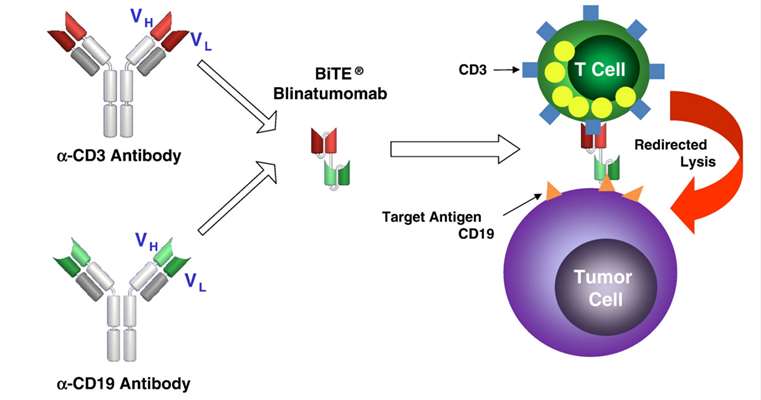Target-Dependent Cellular Cytotoxicity (TDCC) is an important mechanism by which antibody drugs induce target cell death. At Creative Proteomics, we are dedicated to providing comprehensive and reliable testing services for antibody drugs. With our state-of-the-art facilities and experienced team of scientists, we offer a wide range of TDCC activity testing services to assess the efficacy and safety of antibody drugs.
Introduction of TDCC
Killing of target cells by killer CD8+ T-lymphocytes (CTLs) can be achieved by a variety of mechanisms and involves a series of "orchestrated" events that usually culminate in the apoptosis and clearance of the target cells. Many CTLs initiate target cell killing by delivering pro-apoptotic molecules through the release of cytotoxic granules. binding of the TCR to MHC class I induces the synthesis of perforin and granzymes stored in cytoplasmic solutes. Once bound, granzyme is released, then specifically targets neighboring cells for death. Perforin accumulates in the target membrane, allowing the granzyme to enter the target cell. Immune cell-induced cytotoxicity can be induced by various therapeutic agents such as mono- and bispecific antibodies.
 Fig. 1 Blinatumomab, a bispecific single-chain antibody construct with dual specificity for CD19 and CD3, is the front runner of the Bispecific T-cell engaging antibody class.
Fig. 1 Blinatumomab, a bispecific single-chain antibody construct with dual specificity for CD19 and CD3, is the front runner of the Bispecific T-cell engaging antibody class.
Our TDCC Testing Services
Creative Proteomics offers comprehensive TDCC assay services. Our team of experienced scientists will guide you through the entire process, from experimental design to data analysis. We have developed robust protocols and optimized techniques to ensure accurate and reliable results. Our one-stop-shop service solutions, which include the following areas:
We offer isolation of T-cells from various sources, including peripheral blood, bone marrow, and lymph nodes. We can also customize the isolation process based on unique requirements.
We provide expert assistance in the preparation of target cells, including tumor cell lines, primary cells, or genetically modified cells. We can help you select the most appropriate target cells for your study.
Our team will optimize assay conditions, including effector-to-target cell ratios, incubation times, and antibody concentrations, to ensure optimal assay performance.
- Advanced testing technology
We utilize state-of-the-art technologies to accurately measure and quantify T-cell cytotoxicity. We can provide comprehensive analysis for your TDCC assays, including cell viability, target cell lysis, and T-cell activation markers.
Our team is proficient in data analysis using various statistical methods, providing you with comprehensive reports and interpretation of results.
Our Testing Methods
- LDH release method
- Flow Assays
- Flow assays for T-cell activation: CD25, CD69
- Assays for cytokine secretion: IL2, IL-6, TNF-α, IL-2, etc.
TDCC Testing Service Features
- Rich experience in antibody program testing.
- Developing experimental programs for customers according to the mechanism of action.
- Sensitive detection method to ensure the stability and reliability of TDCC experiments.
Creative Proteomics offers flexible services that allow to customize your TDCC activity test to your unique requirements. Contact us to learn more about how our antibody drug TDCC activity testing services can help make your drug development efforts a success.
Reference
- Nagorsen, D.; et al. Immunomodulatory therapy of cancer with T cell-engaging BiTE antibody blinatumomab. Experimental cell research. 2011, 317(9): 1255-1260.

 Fig. 1 Blinatumomab, a bispecific single-chain antibody construct with dual specificity for CD19 and CD3, is the front runner of the Bispecific T-cell engaging antibody class.
Fig. 1 Blinatumomab, a bispecific single-chain antibody construct with dual specificity for CD19 and CD3, is the front runner of the Bispecific T-cell engaging antibody class.